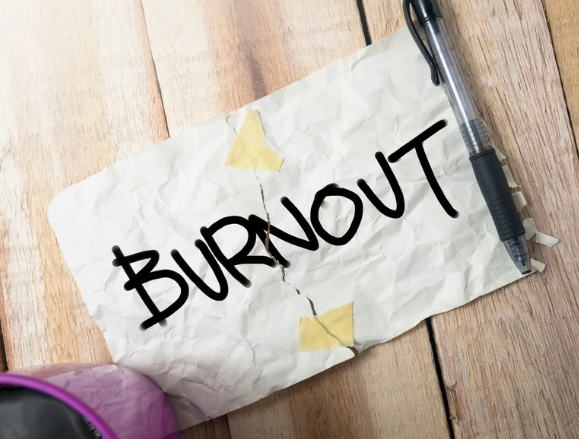Burnout is a real struggle for remote workers, but it doesn't have to be when you know how to prevent and get yourself out of it.

Are you starting to really dislike your job?
If you're also feeling exhausted, emotionally drained, and lacking in motivation and accomplishment, you may be dealing with a case of burnout.
While not a medical or psychological term, burnout happens when your job starts impacting your physical and mental well-being.
Researchers from the Harvard Business Review say close to 50% of people are burned out at work[*].
Are you in this state of job-related stress?
What is Burnout?
Burnout happens as a result of chronic job stress.
Herbert Freudenberger first identified burnout back in 1974 and learned many symptoms tend to overlap with those of mental health conditions such as depression, anxiety, and mood disorders[*].
In one study, participants with burnout and volunteers with major depression reported similar symptoms and severity levels. Those with burnout actually experienced eight of the nine criteria used to diagnose major depressive episode[*].
So basically: burnout and depression may be the same.
What are the Signs of Burnout (or Impending Burnout)
Burnout is more than dreading Monday morning.
You may feel physical symptoms like constant headaches, body pains, or stomach and bowel issues or emotional ones like withdrawing from relationships.
Trouble focusing and concentrating, which may lead to less engagement with your work and greater pessimism, is also common.
Burnout symptoms mainly fall under three umbrellas:
#1. Exhaustion. Usually the first sign of burnout, prolonged stress is especially draining on your mental and physical health and can make you feel tired all the time.
People are now twice as likely to report exhaustion due to work, a 32% increase from 20 years ago[*].
#2. Cynicism. Symptoms include feeling disengaged from work, disillusioned about your contributions, super critical of your own work, and impatient, irritable, and quick to anger with coworkers.
#3. Inadequacy. You may consider giving up or not think it's worth putting in the effort to get your job done. You may also feel frustrated, stuck, and uncreative; and have a hard time getting started and staying productive. Being overwhelmed by your workload and lacking any real satisfaction when it's all done fit here too.

While your symptoms of burnout may be a little different, notice more than a few of these and you may already be deep in burnout territory or very close to it.
If you're currently telecommuting or want to work remotely you may reach this point sooner than others.
Why Remote Workers Experience Burnout More Often
Anyone can experience burnout; from perfectionists struggling to get everything right to people who connect their identity with their jobs.
But remote workers are more likely to deal with burnout because they have:
- Higher decision fatigue. Working from home means you're sort of your own boss. Since there's no one to tell you which hours to work, how to complete your projects, when to check in with teammates, etc., all these decisions fall on you.
- Unpredictable or monotonous work. It's not uncommon to work a nine-hour coding sprint or 13 days in a row when you have an untraditional schedule, which can be very draining. Monotonous duties like programming or data entry require a high level of constant attention, which can also lead to fatigue.
- The "always on" mindset. Remote workers often forget to "switch off" from work mode. When you adopt an "always on" mindset and squeeze in work whenever you have a free minute, you'll have fewer real breaks "off" to spend with your friends and family.
- Feelings of isolation and loneliness. As exhaustion rises, so does loneliness[*]. These feelings not only increase stress but also lower productivity and motivation. Loneliness even tanks your overall job satisfaction by 12% -- bad news for remote workers who spend much of their time solo[*].

Experts at the Mayo Clinic say there are serious consequences to burnout, such as[*]:
- Excessive stress
- Fatigue
- Insomnia and trouble sleeping
- Alcohol and substance misuse
- Heart disease
- High blood pressure
- Type 2 diabetes
- A weakened immune system, which increases your susceptibility to colds, the flu, and other minor illnesses
But hope is not lost -- you can beat burnout and prevent it from happening again.
How to Recharge and Beat Burnout
Follow these tips and you'll minimize your chances of burnout and get yourself out of the pit of despair if you're in it:
#1. Find the Cause of Your Stress
Researchers in one study discovered burnout was more likely when employees experienced a mismatch in any of six areas in their job environment[*]:
- Workload
- Control
- Reward
- Community
- Fairness
- Values
According to them, "the greater the gap, or mismatch, between the person and the job, the greater the likelihood of burnout; conversely, the greater the match (or fit), the greater the likelihood of engagement with work."

Each potential mismatch in any of those key areas creates stress, which then leads to burnout over time.
So if you're feeling unfairness, for example, that mismatch will cause emotional stress and exhaustion and create a deep sense of cynicism about your company and those in charge as long as the issue festers.
When you identify your greatest mismatch, commit to making a change.
#2. Change Your Approach
There are only so many aspects of your job you can control. But if you have the power to adjust your workload, move around deadlines, speak with a supervisor about your gripes, etc., just do it.
Start streamlining your workday to reduce the number of decisions you need to make as well. Eat the same healthy breakfast, create a "work uniform" even if it's just jeans and a t-shirt, and stick to a schedule.
The fewer decisions you need to make in your day, the better.
Set work hours will also help you avoid being "on the clock" when you should be taking time off.
#3. Reach Out To Your Support System
Identify your support network of friends and family members and regularly check in for meaningful conversations and meetups to connect.

The power of feeling socially connected can lead to work benefits like[*]:
- Positive relationships with coworkers
- Feeling valued, supported, respected, and secure
- Higher productivity and performance
- Greater self-esteem
- More trust, empathy, and cooperation
Finally, one of the best ways to reignite your work passion is to remember the good times.
#4. Remember Why You Started
Think back to when you were first tweaking your resume for remote work. Remember how eager and excited you were to get started?
Tap into that early desire to do what you do and build on those positives thoughts.
If you started remote work to live like a digital nomad, book your next adventure to look forward to. Or treat yourself with the money you're saving by not commuting every day.
If these happy vibes don't light your professional flame like they used to, maybe it's time to look for a remote job that's better for you. Your skills will be valued elsewhere if you can't resolve the stress creating burnout in your current position.
Check We Work Remotely for the best remote jobs around the world and find one to reignite your passion.
And don't forget to sign up for our emails so new virtual positions in your field don't get snatched up before you can apply for them!
